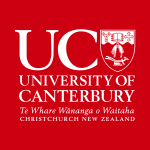Mechanical Engineering courses
University of Canterbury

- New Zealand
- World Rank : 301
- Visit Website
This endorsed research degree is completed by coursework and a thesis. It aims to provide a research focused learning environment in which students can develop their independent problem solving skills through supervised research. The degree may be awarded with Distinction.
Study in a number of advanced Engineering courses will provide each student with key technical knowledge to enhance and support their research activities.
Mechanical engineers design and develop everything that is moving or has moving parts – from airplanes to wind turbines to dishwashers, as well as everything from macroscopic (large) down to nanoscopic (very small). Mechanical engineers are systematic thinkers with a sense of social responsibility that leads them to constantly seek better ways of doing things.
Many mechanical engineers specialise in areas such as materials, dynamics and controls, product design, manufacturing, energy and thermodynamics, and mechanics. Others cross over into other disciplines, working on everything from artificial organs in bioengineering to enhancing the field of nanotechnology.
The Master of Engineering (ME) includes a thesis from your chosen endorsement of 120 points, and up to 45 points of coursework.
Further study
Students can study a Doctor of Philosophy in Bioengineering, Chemical and Process Engineering, Civil Engineering, Earthquake Engineering, Electrical and Electronic Engineering, and Mechanical Engineering at UC.
Career opportunities
Mechanical Engineering graduates are well equipped to meet the challenges of a rapidly changing world by applying their creativity, scientific principles and engineering skills to find solutions to technical problems. Mechanical engineers may work in areas such as:
The degree programme at UC has a strong focus on engineering design and professional relevance. The programme is internationally accredited, and our graduates have gone on to excel in leading technical innovation in many sub-fields.
Bachelors: No specific cutoff mentioned
English language requirements for postgraduate qualifications
If you want to study towards a postgraduate qualification, eg a Postgraduate Diploma, Masters, or PhD you must have one of the following:
ENGLISH TEST
| University Type | Public University |
| Campus Setting | Urban |
| Establishment Year | 1873 |
| No. of Campuses | 1 main campus |
| No. of Residence Halls | 10 |
| Graduate Job Rate | 89.9% (full time) |
| Research Funding | Above 600,000 NZD pa |
| Cost of Attendance | 29,550 NZD pa |
| Applications Accepted | Online |
| Work-Study | Available |
| Intake Type | Semester wise |
| Mode of Program | Full time and online |
| Courses | UG | PG | Doctorate |
|---|---|---|---|
| Arts | 25,500-30,200 | 29,000-33,800 | 6,749 |
| Business | 28,100 | 29,900 | 7,066 |
| Engineering | 42,000 | 42,000 | 8,130 |
| Science | 32,000 | 34,900-36,600 | 7,062–7,855 |
| Law | 30,200 | 33,800 | 7,066 |
You'll require between $20,000 and $25,000 a year ($380–480 per week) for housing/rent, food, transportation, phone bills, internet usage, and entertainment, in addition to your tuition and insurance fees. The average living expense will be the same for everyone, regardless of their tuition or course price. Please keep in mind that these are only suggestions; the Immigration New Zealand requirement is $15,000 per year including return travel or an additional $2,000.
| General expenses | Cost (in NZ dollars) |
| Rent (per month) | $800–$950 |
| Groceries (per week) | $100–$150 |
| Gym membership (per year) | $300 |
| Entertainment (per week) | $50 |
| Milk (per litre) | $3 |
| Coca Cola (per can) | $2 |
| Cup of Coffee | $3–$5 |
| Lunch from University food hall or campus café | $7–$12 |
| Local calls made from a cell-phone | $0.50–$1.50 |
| Taxi - 5 km ride | $10–$12 |
| Movie ticket | $10–$14 |
| Visit to doctor | $45–$85 |
| Tuition Fees in New Zealand (1st Year Average) | BE/Btech NZD 24605 | MBA NZD 25694| MS NZD 29178 | BSc NZD 30702 | BBA NZD 22863 | MEng NZD 41589 | MIM NZD 34186 | MFin NZD 142025 |
| Average Accomodation & Food Costs in New Zealand | NZD 1250 Per Month |
| Entrance Exams in New Zealand | TOEFL: 74 | IELTS: 6 |PTE: 53 |
| Work and Study in New Zealand | Permitted for 20 hours/week with a valid study permit. |
| Post Study Work Permit in New Zealand | One to Three Years Depending on the Region. |
| Cost of Student Visa in New Zealand | NZD 295 |
| Student Visa in New Zealand | If a student wants to study full time in New Zealand for more than three months, and is willing to pay the full cost of the course, Fee-Paying Student Visa is for him/her. |
| Intakes in New Zealand | There are Two Main Intakes in New Zealand: January Intake and July Intake. |
| Top Job Sectors in New Zealand | Engineering, Software Developing/Programming, Medicine, Education, Accounts, Electrician, Automotive Technician, etc. |
| Economy in New Zealand | Growth Rate of 2.8% (2018), 2.5% (2019e), 2.7% (2020e), 22nd Largest in the World by Nominal |
Tuition & fees :
$ 44,000
Hostel & Meals :
$ 16,250
Total
$ 60,250